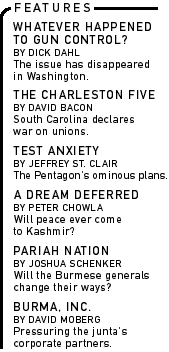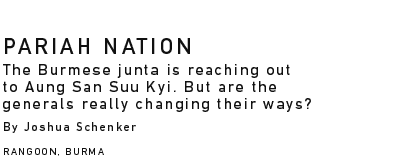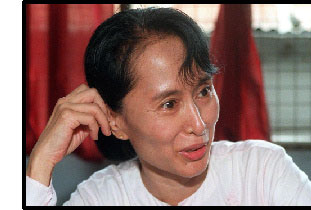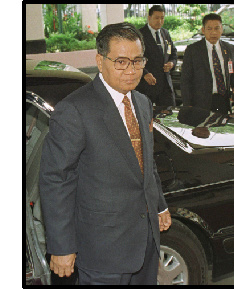|
|

|

|
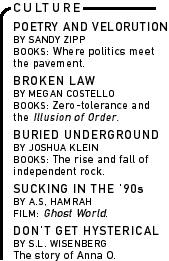
|
|
|
| |
|
|||
|
Most days, the area surrounding University Avenue, home to one of the world's most famous political prisoners, is quiet. Outside the house of Aung San Suu Kyi, the Burmese opposition leader who has been under house arrest on and off since the ruling junta cancelled elections more than a decade ago, barricades prevent curious visitors from getting too close. Troops wander around, smoking cigarettes and chatting among themselves. Several blocks away, a few aging Japanese sedans and battered three-wheeled taxis putter along. Inside Suu Kyi's home, however, momentous happenings appear to be underway. For the first time since the mid-'90s, leaders of the Burmese junta have initiated a dialogue with Suu Kyi's party, the National League for Democracy (NLD), on the shape of Burma's political future. And as discussions between the NLD and the junta have proceeded, some optimistic observers are predicting that four decades of military rule are drawing to a close. But in Burma, a land ruled by an opaque regime, events are rarely as simple as they seem. Burma's politics seem to be changing for the better, but maybe that's because they
Yet in 1990, the military regime allowed free elections, perhaps because the junta mistakenly believed it would win the poll. Instead, the NLD swept the election. Shortly afterward, the junta nullified the vote, and Suu Kyi remained under house arrest. (After throwing out the 1990 elections, the generals began calling the country Myanmar.) She was freed in 1995, but placed under house arrest once again last fall after attempting to travel outside Rangoon to visit members of her party. While Suu Kyi languished, the junta attempted to demolish the NLD. The regime closed Rangoon's universities, which had been hotbeds of protest in 1988, creating a lost generation of Burmese students who never finished their education (hundreds of unemployed young adults can be seen spending their days idling around downtown Rangoon). Lower-level NLD workers were detained in government-run "guesthouses," and many NLD party offices were shuttered. Tin Oo, a leading member of the State Peace and Development Council (SPDC), the official name for the junta, told Burma's state press that Suu Kyi would be "crushed without mercy." In January, however, a junta spokesman unexpectedly announced that the generals were talking with Suu Kyi in an effort to promote national reconciliation and stability. Although the junta has refused to provide details of the talks, sources in the military say that top members of the junta have been regularly visiting Suu Kyi's home. In an apparent effort to demonstrate its sincerity, the junta also has made concessions to the NLD. The generals have allowed Suu Kyi to meet with the U.N. human rights inspector, who had been barred from Burma for five years. The SPDC has released more than 140 political prisoners, including two famous comedians known here as the "Mustache Brothers" who had been jailed for performing skits that poked fun at the government. The military also allowed the NLD to reopen a party office in Taikkyi, a suburb of Rangoon, and freed Suu Kyi's cousin and aide, Aye Win, from prison. "The SPDC has taken some steps that show they're trying to boost goodwill towards Suu Kyi," says David Steinberg, a Burma expert at Georgetown University. Almost immediately, key players praised the apparent rapprochement. In early 2001, the All Burma Students Democratic Front, a Thailand-based organization of Burmese students who have fled the country, celebrated the dialogue as "a historic breakthrough." Meanwhile, Surakiart Sathirathai, foreign minister of Thailand, told reporters: "National reconciliation [in Burma] is moving." Exactly why the SPDC decided to open a dialogue with Suu Kyi is unclear. A few analysts say sanctions levied against Burma by Western governments--including the United States--finally embarrassed and isolated the regime so much that it was forced to negotiate. Others posit that Burma's recent economic collapse forced the generals to the bargaining table. The Burmese economy definitely has seen better times: Inflation is running at more than 20 percent, and the country's currency, the kyat, is depreciating precipitously. Essential goods in Rangoon have become at least four times more expensive over the past three years. But to many Burma experts, one thing is clear: The military is not going to fade away into the smoggy Rangoon night. "The regime doesn't want to lose control--it saw how the military in Indonesia was made feebler when it allowed some power to be handed over to civilians," says Michael Aung-Thwin, a Burma expert at the University of Hawaii. "The junta remains conservative, and I don't think for a moment that the NLD will wind up in charge of the country." Indeed, while talking with Suu Kyi and using the dialogue to woo the regional and
What's more, Suu Kyi remains under house arrest, and the country's jails are still near bursting. According to Amnesty International, the Rangoon junta holds more than 1,800 political prisoners. Over the past year, the military arrested more than 200 members of opposition parties. "While they're talking with Suu Kyi, the military is taking more political prisoners," says Jeremy Woodrum, director of the Washington office of the Free Burma Coalition, a pro-democracy group. On this year's Armed Forces Day, a time when top brass signal the coming year's policies, junta head Than Shwe warned that democracy would bring "chaos and instability" to Burma. Than Shwe's tough comments lend credence to reports that, even as talks continue, a group of hard-liners centered around army chief Maung Aye has gained the upper hand within the SPDC. Perhaps because of the junta's intransigence, Suu Kyi did not appear at a Martyr's Day parade honoring her father--a move analysts took as a sign the opposition leader was fed up with the regime's dialogue. Outside Rangoon, the military continues to battle ethnic-minority militias and to align itself with some of the world's most unsavory drug traffickers. The SPDC "continues to vigorously wage war against the ethnic nationalities and ruthlessly oppresses the people," read a statement issued by the Karen National Union (KNU), one of the leading militias. "These acts are diametrically opposed to the goal of resolving basic political problems." To fight the KNU and other ethnic minority groups pushing for democracy, the junta allies itself with the United Wa State Army (UWSA), a guerrilla group based along the Thailand border that funds itself by trafficking opium, amphetamines and other drugs. Although SPDC leaders insist they are doing their best to combat narcotics production, drug enforcement officials based in Southeast Asia contend that the Rangoon regime turns a blind eye to the UWSA's business, and even skims off a percentage of their drug money. "The drug trade has become a significant factor in the overall economy, and the regime has obtained vital revenue from the reinvestment of narcotics profits," says a report on Burma by the International Crisis Group. In recognition of the junta's support, the UWSA battles ethnic minority opponents of the junta. Meanwhile, the SPDC has utilized the talks with Suu Kyi to boost ties with Asian neighbors, who are more important to the junta's long-term survival. Rangoon today has few economic ties with Western nations--Japan, China, India, Thailand, Singapore and Pakistan are Burma's most important allies--and the country's economy revolves around the military. "The junta has tight control of the important sectors of the economy, and it is actually consolidating that control," Aung-Thwin says. "The Asian nations are much more willing to do business with Burma. ... The sanctions don't really affect Burma's business with China or Thailand." These Asian allies now are drawing closer to Rangoon, as the stigma of dealing with the SPDC has begun to dissipate. Over the past two months, Japan's most powerful business group, the Keidanren, has held talks with the junta, and the Japanese government has approved a $28.6 million aid package to Rangoon. "It is extremely important to the Japanese government that they have influence in Burma," Steinberg says. "They will do most anything to be in Burma." Meanwhile, Malaysia is helping to develop Burma's gas fields, and Thailand's new prime minister, Thaksin Shinawatra, has demonstrated no interest in discussing Burma's human rights problems. Despite the significant obstacles to any deal between the junta and Suu Kyi, several influential commentators continue to promise a major breakthrough. Thai Defense Minister Chavalit Yongchaiyudh, who has close ties with several SPDC members, told local reporters that the NLD and the junta could soon form a national government. "I've got a sixth sense that something positive is going to happen soon," Chavalit said. "The trend is quite encouraging." Meanwhile, Roger Mitton, a writer for Asiaweek and probably the most influential journalist on Burma issues, has suggested that the junta and NLD might agree to a deal in which the generals would receive an amnesty and Suu Kyi would become head of state. But this optimism seems misplaced. Burma has little culture of political pluralism: Since World War II, the country has experienced six decades of turbulence, in-fighting and military rule. Ethnic divisions still plague the country. The junta continues to hold nearly all the cards, and it may be playing its aces to lure Asian companies and overcome Western sanctions. "The SPDC has held talks with Suu Kyi before [in 1994], when they ended the talks and then blamed the failure on Suu Kyi," Woodrum says. "They could easily end the dialogue again and then blame Suu Kyi for being difficult." Indeed, Steinberg adds, even if the dialogue between the SPDC and Suu Kyi continues, the most likely scenario is some arrangement where the junta retains almost total power over the command-style economy and considerable control over the political scene. For its part, Washington can't do much to help the opposition.
Although Burma's economy is in bad shape, and proposed U.S. legislation
to ban all imports from Burma would hurt Rangoon's garment industry,
as the SPDC develops closer trade and aid links with its Asian neighbors
it has less need for American investment. "Certainly, the regime
would like American companies to come to Rangoon, but it doesn't
need them if Japan and Thailand are pragmatic and invest in Burma,"
says Aung-Thwin. "So the SPDC can continue to go its own way." Joshua Schenker is the pen name of a journalist who has written extensively on Southeast Asian politics. Now read David Moberg's article, "Burma Inc."
|




